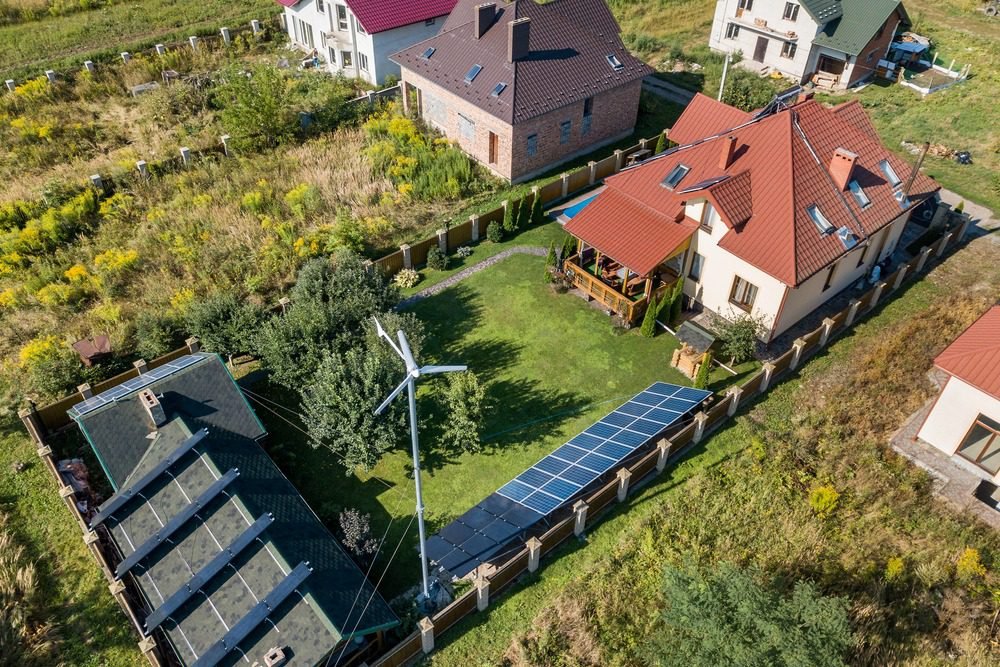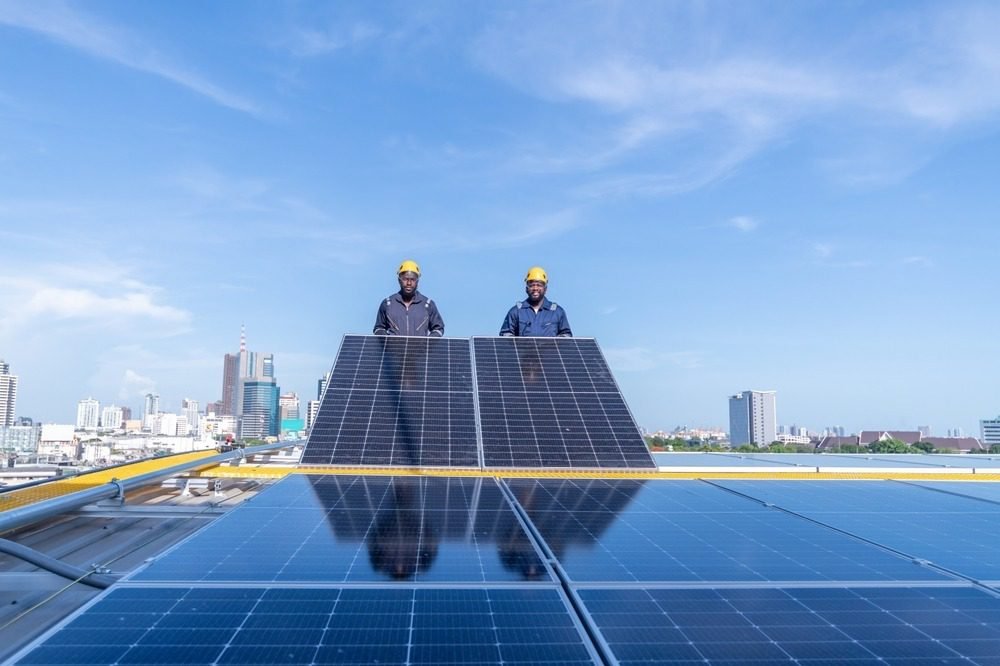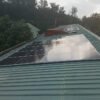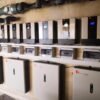Off-Grid Solar Systems in Kenya.
Off-Grid Solar Systems in Kenya: The Future of Energy Independence.
By RiiSun Solar Energy Experts.
Empowering Kenyan Homes and Businesses with Reliable, Independent Power Solutions.
Off-Grid Solar Systems in Kenya. Kenya’s energy landscape is changing fast. Across the country—especially in rural and peri-urban areas—more Kenyans are moving away from unreliable or unavailable grid power (KPLC) and embracing off-grid solar systems as their main source of electricity. At the forefront of this energy revolution is RiiSun Solar Energy Experts—a trusted solar installer delivering sustainable energy solutions to homes, farms, schools, health facilities, and businesses nationwide.

Why Off-Grid Solar Systems Are Gaining Popularity in Kenya
Millions of Kenyans still live in areas with:
- Limited or no access to KPLC.
- Frequent blackouts or power fluctuations.
- High and unpredictable electricity bills.
- Long delays in rural electrification.
With rising KPLC tariffs and unreliable grid supply, off-grid and hybrid solar systems have become the go-to solution for reliable, affordable, and clean energy.
RiiSun Solar Energy Experts designs, supplies, and installs solar systems across the country—ensuring all Kenyans, no matter their location, have access to energy independence.
What Is an Off-Grid Solar System?
An off-grid solar system is a complete, standalone power setup that works independently of the national electricity grid (KPLC).
It includes:
- Solar panels.
- Battery storage systems.
- Charge controller.
- Inverter (to convert DC to AC).
- Optional backup generator.
These systems are designed to generate, store, and supply all the power you need—even at night or during cloudy days.
Where We Offer Off-Grid Solutions
- Turkana, Marsabit, and Isiolo – We power remote homesteads and boreholes with solar water pumps and lighting systems.
- Kitui, Makueni, and Taita Taveta – We install solar for off-grid farms, dispensaries, and boarding schools.
- Trans Nzoia and Bungoma – We help farmers switch from diesel to solar irrigation systems.
- Lamu and Kwale – We power beach hotels and resorts fully on solar.
Whether you’re in a remote village or off-grid town, RiiSun comes to you with customized solutions.
Hybrid Inverters vs. Grid-Tied Systems
Understanding the difference between solar inverter types is key when deciding what system to install. At RiiSun, we help clients select the most efficient and reliable system for their area and energy needs.
🔹 Hybrid Inverter Systems
A hybrid inverter connects to solar panels, batteries, and the grid (KPLC or generator). It intelligently switches between sources to keep your power flowing.
Benefits:
- Uses solar during the day.
- Stores excess power in batteries for night use.
- Switches to KPLC or generator only when needed.
- Works during blackouts.
Where We Install Hybrid Systems:
- Kisumu, Eldoret, and Meru – Ideal for homes that have KPLC but suffer from outages.
- Kikuyu, Kitengela, and Thika – We serve residential estates needing backup power.
- Embu, Kericho, and Naivasha – We help hotels, hospitals, and private clinics stay powered 24/7.
🔸 Grid-Tied Systems
A grid-tied system is connected to KPLC and relies on the grid to operate. It reduces your power bill but does not work when the grid is down unless combined with batteries.
Benefits:
- Cost-effective for urban businesses and institutions.
- Great for reducing electricity bills during daytime operations.
Limitations:
- Shuts down during blackouts.
- Not suitable for off-grid or rural areas.
Where We Install Grid-Tied Systems:
- Nairobi CBD, Westlands, and Industrial Area – We support offices and warehouses.
- Mombasa and Nakuru – We install for shopping malls, supermarkets, and commercial buildings.
Why RiiSun Recommends Off-Grid and Hybrid Solar for Rural Kenya
In most parts of rural Kenya, KPLC is either unreliable or completely unavailable. RiiSun Solar Energy Experts has designed energy solutions tailored for remote settings with high energy demands and no grid access.
We have successfully delivered:
- Solar lighting and refrigeration systems for dispensaries in Kajiado, Bomet, and Kwale.
- Solar irrigation pumps for farms in Laikipia, Busia, and Machakos.
- Complete home systems in areas like Wajir, Garissa, and Samburu, where KPLC has never reached.
Our mission is to provide clean, affordable, and uninterrupted power—everywhere in Kenya.
What We Offer Nationwide
✅ Solar Panel Supply and Installation
We supply Tier 1 solar panels and install them for homes, farms, and businesses across all 47 counties.
✅ Lithium and Deep Cycle Battery Storage
We size and install storage systems in Narok, Nyandarua, Kakamega, and more—ensuring 24-hour power supply.
✅ Solar Water Pumping Systems
We help rural farmers and borehole owners reduce fuel and electricity costs with solar-powered pumps in areas like Kitale, Mwingi, and Voi.
✅ Solar Water Heating Systems
We install both pressurized and non-pressurized solar water heaters for homes, hotels, and schools in Nanyuki, Kisii, and Limuru.
✅ Solar System Maintenance & Upgrades
Our mobile support teams service solar systems across Kenya, from urban Nairobi to rural Lodwar.
Client Testimonials
“RiiSun gave our remote lodge in Samburu total independence from KPLC. We now power all our guest rooms, kitchen, and office—entirely on solar.”
– Peter K., Lodge Owner
“We installed an off-grid system in our home in Kitui. The panels, batteries, and inverter are working perfectly. Zero blackouts, zero bills.”
– Rose M., Kitui County
Contact RiiSun Solar Energy Experts Today
Whether you want to reduce power bills, go off-grid, or secure backup for your business—RiiSun has the solution.
General Solar Questions.
1. How much does a basic solar system cost in Kenya?
A basic solar system starts at Ksh 350,000 to Ksh 500,000+, depending on power needs.
2. Can solar power run a fridge in Kenya?
Yes, but you need a 200W+ solar panel and a 200Ah battery for reliable performance.
3. How long do solar batteries last in Kenya?
Lead-acid batteries last 3–5 years, while lithium-ion batteries last 7–10 years with proper maintenance.
4. What is the best solar panel brand in Kenya?
Top brands include Jinko, Canadian Solar, Risen, and Longi for efficiency and durability.
5. How much does it cost to install solar in a 3-bedroom house?
A full system (lights, TV, fridge, water pump) costs Ksh 350,000–Ksh 800,000, depending on energy needs.
Solar for Home & Business.
6. Can solar power a washing machine?
Yes, but you need at least 1,000W solar panels and a 2,500W inverter for best results.
7. How many solar panels do I need for a small business?
A small shop may need 2–4 panels (400W–800W), while larger businesses require 10+ panels (2,000W+).
8. Can solar power an air conditioner in Kenya?
Yes, but it requires a high-capacity system (5kW+) due to high power consumption.
9. How much does a solar water heater cost in Kenya?
Prices range from Ksh 80,000 to Ksh 180,000, depending on size and brand.
10. Can I use solar without a battery?
Yes, but only during the day (grid-tied systems). Batteries store power for nighttime use.
Installation & Maintenance.
11. How long does solar installation take in Kenya?
Small systems take 1–2 days, while larger installations may take 3–7 days.
12. Do solar panels work during cloudy days?
Yes, but at reduced efficiency (30–50% output). Battery backup ensures continuous power.
13. How often should I clean solar panels?
Every 2–3 months, especially in dusty areas, to maintain efficiency.
14. Can I install solar myself?
Basic systems can be DIY, but professional installation is recommended for safety and warranty.
15. What maintenance do solar systems need?
Regular battery checks, panel cleaning, and inverter inspections ensure long-term performance.
Cost & Financing.
16. Are there financing options for solar in Kenya?
Yes.
17. Is solar cheaper than KPLC in the long run?
Yes! After the initial cost, solar reduces monthly bills by 80–100% over time.
18. How much does a 5kW solar system cost in Kenya?
Between Ksh 700,000–Ksh 1,000,000, including installation.
19. Does the government offer solar subsidies?
Some programs exist, but most Kenyans rely on private financing and grants.
20. Can I sell excess solar power to KPLC?
Yes, through net metering, but the process is still developing in Kenya.
Solar for Farms & Rural Areas.
21. Can solar power a water pump for farming?
Yes! Solar water pumps cost Ksh 70,000–Ksh 500,000, depending on horsepower.
22. How many solar panels do I need for a borehole pump?
A 1HP pump typically needs 4–6 solar panels (800W–1,200W).
23. Can solar power electric fences?
Yes, small solar systems (50W–100W) are perfect for farm security.
24. What’s the best solar system for a chicken farm?
A 500W–1,000W system can power lights, incubators, and fans.
25. How much does a solar-powered irrigation system cost?
Between Ksh 200,000–Ksh 800,000, depending on pump size and land area.
Batteries & Inverters.
26. Which is better, lithium or lead-acid batteries?
Lithium lasts longer (7+ years) but is more expensive. Lead-acid is cheaper but requires maintenance.
27. How much does a 200Ah battery cost in Kenya?
Lead-acid: Ksh 35,000–Ksh 55,000 | Lithium: Ksh 100,000–Ksh 180,000.
28. What size inverter do I need for a fridge?
A 1,000W–1,500W inverter is ideal for most fridges.
29. Can I connect a generator to my solar system?
Yes, hybrid inverters allow solar + generator backup.
30. How long can a 100Ah battery power a TV?
About 8–12 hours, depending on TV wattage.
Solar vs. Other Energy Sources.
31. Is solar better than a generator?
Yes! Solar is cheaper long-term, silent, and maintenance-free vs. fuel costs for generators.
32. Can I combine solar with grid power?
Yes, hybrid systems use both solar and KPLC for uninterrupted power.
33. Is solar reliable during Kenya’s rainy season?
With proper battery storage, solar works year-round.
34. How does solar compare to wind power in Kenya?
Solar is more common and easier to install, while wind requires specific locations.
35. Can solar replace KPLC completely?
Yes, with enough panels and batteries, you can go fully off-grid.
Solar for Schools & Institutions.
36. How much does solar cost for a school?
Small schools: Ksh 600,000–Ksh 2.5M | Large institutions: Ksh 3M+.
37. Can solar power a computer lab?
Yes, a 3kW–5kW system can run 10+ computers.
38. Do hospitals use solar in Kenya?
Yes! Many rural clinics use solar for lighting, refrigeration, and medical devices.
39. Can solar power a school water pump?
Absolutely! Solar pumps are cost-effective for schools.
40. Are there government solar projects for schools?
Some NGOs and government programs install solar in rural schools.
Mobile & Portable Solar.
41. How much is a portable solar kit in Kenya?
Small kits (for phones/lights) cost Ksh 3,000–Ksh 15,000.
42. Can solar charge a phone?
Yes! Small 10W–20W solar panels can charge phones easily.
43. Are solar torches worth it?
Yes! They’re affordable (Ksh 500–Ksh 3,000) and great for emergencies.
44. Can I use solar for camping in Kenya?
Yes, portable solar power banks and foldable panels are ideal.
45. How much is a solar-powered fan?
Between Ksh 2,500–Ksh 8,000, depending on size.
Warranty & Reliability
46. Do solar panels come with a warranty?
Yes, most panels have 10–25 years warranty, batteries 1–5 years.
47. What happens if a solar panel breaks?
It can be replaced under warranty if damaged under normal use.
48. How long do inverters last?
Good-quality inverters last 5–10 years.
49. Can hail damage solar panels?
Most panels are hail-resistant, but extreme weather can cause damage.
50. Where can I buy genuine solar products in Kenya?
Trusted dealers include RiiSun, Solinc, Davis & Shirtliff, and Sun King.



